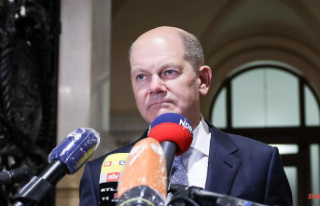After his initial silence on Abbas' comparison to the Holocaust, the Chancellor has met with massive criticism. The anti-Semitism officer jumps to Scholz's side. Nevertheless, the criticism does not stop. The International Auschwitz Committee, for example, thinks the chancellor was not properly prepared.
After the Holocaust scandal surrounding Palestinian President Mahmoud Abbas, the German government's anti-Semitism commissioner, Felix Klein, defended Chancellor Olaf Scholz against criticism. "I think it was primarily a communication problem between the chancellor and his government spokesman," he said on ARD. "The Chancellor's position on Israel and on Israel-related anti-Semitism is very clear." He believes that the chancellor is on solid ground here.
Scholz did not contradict Abbas at a joint press conference in Berlin on Tuesday when he accused Israel of multiple "Holocausts" against the Palestinians, but only reacted later. The Union, among others, had sharply criticized this.
Federal President Frank-Walter Steinmeier condemned Abbas' statements. "The comparison made yesterday by President Abbas in relation to Israel is completely unacceptable and particularly painful because it was made in our country's capital," the German head of state told the "Bild" newspaper. Germany acknowledges its historical responsibility and stands firmly on Israel's side.
Abbas said at the appearance with Scholz: "Since 1947 to this day, Israel has committed 50 massacres in 50 Palestinian locations." He added: "50 massacres, 50 holocausts." The Chancellor only distanced himself from the statements after the press conference. He told the "Bild" newspaper: "Especially for us Germans, any relativization of the Holocaust is intolerable and unacceptable." The German government spokesman Steffen Hebestreit later took responsibility for the criticized process: he ended the press conference by Scholz and Abbas too quickly.
In a phone call with Israel's Prime Minister Jair Lapid later in the day, Scholz wants to prevent further irritation. FDP General Secretary Bijan Djir-Sarai considers Abbas' Holocaust comparison to be counterproductive with regard to the Middle East peace process. "It is once again becoming clear that no progress can be expected in the peace process with this generation of Palestinian politicians. Abbas did the Palestinians no favors with his appearance in Berlin," he told the "Rheinische Post". "To make tasteless and historically incorrect claims about the Holocaust in Germany of all places represents a tremendous provocation."
Klein spoke out in favor of not letting the thread of conversation with Abbas break, despite the scandal. "President Abbas has repeatedly attracted attention with oral and written statements about Israel," he said. "On the other hand, he is the representative of the Palestinian community and you have to deal with him now." He hopes that the Palestinian side has also learned that such statements are unacceptable in Germany.
Previously, the chairwoman of the support group for the Memorial to the Murdered Jews of Europe, Lea Rosh, had questioned aid funds for the Palestinian Authority. Abbas' "outrageous statement" must have consequences. According to the German Development Ministry, Germany is one of the largest donors in the Palestinian territories. So far, the Federal Republic has committed more than 1.2 billion euros for bilateral development cooperation.
Abbas has already tried to dampen the outrage over his controversial Holocaust statements. In Berlin, he did not want to question the uniqueness of the Holocaust, he said, according to the Palestinian news agency Wafa. The CDU, meanwhile, followed up on its criticism of the Chancellor's appearance. The vice chair of the German-Israeli parliamentary group, Gitta Connemann, demanded an apology from Scholz. It was a scandal that the chancellor remained silent after Abbas' statements "and then shook Abbas' hand," she told the newspapers of the Funke media group. The chancellor's silence harms Germany in terms of foreign policy, "first and foremost towards Israel." The chancellor must limit the damage and explain himself. "And he has to apologize," said the CDU politician.
Scholz received support from the ranks of the Greens. Lamya Kaddor, member of the Bundestag, also accused the Chancellor of making mistakes, but rejected the far-reaching allegations against him. It was "absolutely inappropriate" to want to gain political capital from Scholz's behavior, as the CDU is trying to do. The International Auschwitz Committee complained that Scholz had insufficiently prepared himself "for the expected provocations" by Abbas. "It is also a duping of the chancellor and an attempt to build up pressure against the federal government and against Olaf Scholz," Executive Vice President Christoph Heubner told the newspapers of the Funke media group.












